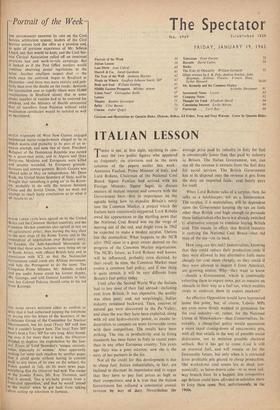ITALIAN LESSON
THERE is not, at first sight, anything to con- nect the two public figures who appeared so frequently on television and in the news columns of the papers earlier this week : Amintore Fanfani, Prime Minister of Italy, and Lord Robens, Chairman of the National Coal Board. Signor Fanfani had arrived with his Foreign Minister, Signor Segni, to discuss matters of mutual interest and concern with the Government here—first in importance on the agenda being how to expedite Britain's entry into the Common Market, a project which the Italians have consistently supported. Lord Robens owed his appearances to the startling news that the National Coal Board was on the verge of moving out of the red, and Might even in 1962 be expected to make a modest surplus. Therein lies the connection. What happens to the NCB after 1962 must to a great extent depend on the progress of the Common Market negotiations. The NCB's future, as Lord Robens well knows, will be influenced, probably even dictated, by their result. In time, the Common Market must evolve a common fuel policy; and if one thing is quite certain, it will be very different from Britain's fuel policy today.
Until after the Second World War the Italians had to buy most of their fuel abroad—including coal from Britain. It was expensive, the quality was often poor; and, not surprisingly, Italian industry remained backward. Then, reserves of natural gas were discovered in the Po Valley; and since the war they have been exploited, along with oil and hydro-electric power, to enable in- dustrialists to compete on more favourable terms with their competitors. The results have been striking. The rise in productivity and in living standards has been faster in Italy in recent years than in any other European country. Ten years ago Italy was a poor relation; now she is the envy of her partners in the Six.
Not all the credit for this development is due to cheap fuel. Italian industrialists, in fact, are inclined to discount its importance and to argue that they have to pay fuel prices as high as their competitors; and it is true that the Italian Government has collared a substantial annual revenue by way of duty. Nevertheless the average price paid by industry in Italy for fuel is considerably lower than that paid by industry is Britain. The Italian Government, too, can use all the revenue it extracts from the fuel duty for social services. The British Government has at its disposal only the revenue it gets from the duty on imported fuels: coal barely pays for itself.
When Lord Robens talks of a surplus, then, he talks as a bookkeeper, not as a businessman. The surplus, if it materialises, will be dependent upon the Government keeping the tax on fuels other than British coal high enough to persuade those industrialists who have not already switched t alternative sources to continue buying British coal. This means, in effect, that British industry is carrying the. National Coal Board—that old man of the sea—on its back.
How long can this last? Industrialists, knowing that they could reduce their production costs if they were allowed to buy alternative fuels more cheaply (or coal more cheaply, as they could if they were allowed to import it from America), are growing restive. Why—they want to know —should a Government, which is continually exhorting them to export more, put so massive an obstacle in their way as a fuel tax, which enables rivals to undercut them in export markets?
An effective Opposition would have hammered home this point; but, of course, Labour MPs are even more firmly wedded to protection for the coal industry—or, rather, for the National Union of Mineworkers—than Conservatives. In- evitably, a cheap-fuel policy would necessitate a more rapid closing-down of uneconomic pits, with all that entails in the way of possible social dislocation, not to mention possible electoral setback. But it has got to come. Coal is still an essential fuel, and will remain so for the foreseeable future, but only when it is extracted from profitable pits geared to cheap production. Old worked-out coal seams are as dead, eco- nomically, as horse-drawn cabs—or as most rail- way branch lines. In a happier, less competitive age Britain could have afforded to subsidise them to keep them open. Not, unfortunately, in the 1960s.


































 Previous page
Previous page